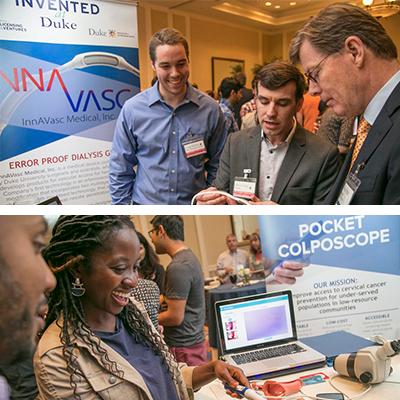
Entrepreneurism is in the air.
The qualities of a successful entrepreneur typically include discipline, creativity, high risk tolerance, and flexibility. What may not be exactly second nature are the skills to develop a network, the legal expertise to patent a discovery, or an understanding of how to secure funding to launch a start-up.
This is where Duke steps in. With a dizzying array of resources and expertise offered by the Innovation and Entrepreneurship Initiative, the Center for Advanced Social Entrepreneurship (CASE), MEDx, the Duke Angel Network, and the Office of Licensing & Ventures (OLV), to name a few, all designed to support aspiring students, faculty, and staff who wish to pursue their entrepreneurial dreams, it is no wonder 2017 was a record year.
Last year, researchers at Duke launched 11 start-ups, with four initiating in the School of Medicine and seven in the Pratt School of Engineering. Additionally, 315 invention disclosures were filed, 85 U.S. patents were issued, and 205 new U.S. patent applications were submitted. Of the invention disclosures, 206 were from the School of Medicine. Duke saw a 50 percent increase in the total number of agreements with commercial partners, with 95 agreements stemming from the School of Medicine, and $45 million in revenue generated from Duke-licensed pharmaceuticals and other inventions.
kēlaHealth is one such start-up. Co-founded by Duke School of Medicine alum Bora Chang, MD’17; Erich Huang, MD, PhD, assistant professor in biostatistics and bioinformatics; Suyesh Kunar, BSE; Ouwen Huang, BS; and Jeff Sun, MD, kēlaHealth uses big data to reduce the risk of surgical complications. By analyzing data from millions of patients, the platform identifies specific areas of high risk that a surgical team should be aware of before scrubbing in, and makes recommendations to mitigate these identified risks. kēlaHealth is a recipient of one of the National Science Foundation’s America’s Seed Fund grants, and was one of six recent recipients of an NC IDEA seed grant.
POCKeT Colposcope, developed by Nimmi Ramanujam, PhD, the Robert W. Carr Jr., Professor of Biomedical Engineering and professor of pharmacology and global health, and colleagues at Duke University’s Global Women’s Health Technologies Center, is another example of innovation at Duke. The Pocket Colposcope is a low-cost, portable cervical cancer screening device designed to be used in low-resource countries where access to screening is typically unavailable. The device is small, lightweight, easy to clean, and provides imaging for diagnosis that could potentially save hundreds of thousands of women’s lives.
With interdisciplinary collaboration on the rise, the enthusiastic support of leadership, and diverse new ideas stemming from an increasingly global cohort of students, the upward trend in innovation at Duke will undoubtedly continue. What remains to be seen, and is perhaps most exciting, is the impact Duke’s new start-ups will have around the world.
So, what’s your great idea?
Tell The Office of Licensing & Ventures about it; they can help!